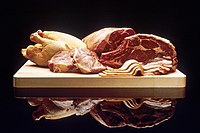
Photo from wikipedia
Over two studies we investigated the effect of various written interventions (passages) on the disgust response towards a food (falafels) which supposedly contained mealworm (insect) flour. Actually, participants (Study 1… Click to show full abstract
Over two studies we investigated the effect of various written interventions (passages) on the disgust response towards a food (falafels) which supposedly contained mealworm (insect) flour. Actually, participants (Study 1 N = 80, Study 2 N = 78) were given the same non-mealworm containing food in all conditions. Disgust was measured using: tactile sensitivity, food intake, liking and desire to eat. Results of Study 1 showed that a sustainability passage (sustainability advantages of entomophagy), but not a delicacy passage (oro-sensory qualities of insects), was effective in reducing disgust. In Study 2, contrary to prediction, a passage describing the sustainability and nutritional advantages entomophagy failed to reduce disgust - falafel intake, liking and desire to eat were decreased. However, a passage which described how mealworm flour is produced, did significantly reduce disgust. Taken together, these studies demonstrate that written passages can alter the disgust response, notably resulting in a maintenance of food intake. Interventions that increase the perception of familiarity of a novel food, but not logic-based arguments, may be a key driver of the amelioration of disgust. These results also support the suggestion that altering the ideational component of disgust can result in changes of distaste perception.
Journal Title: Appetite
Year Published: 2021
Link to full text (if available)
Share on Social Media: Sign Up to like & get
recommendations!